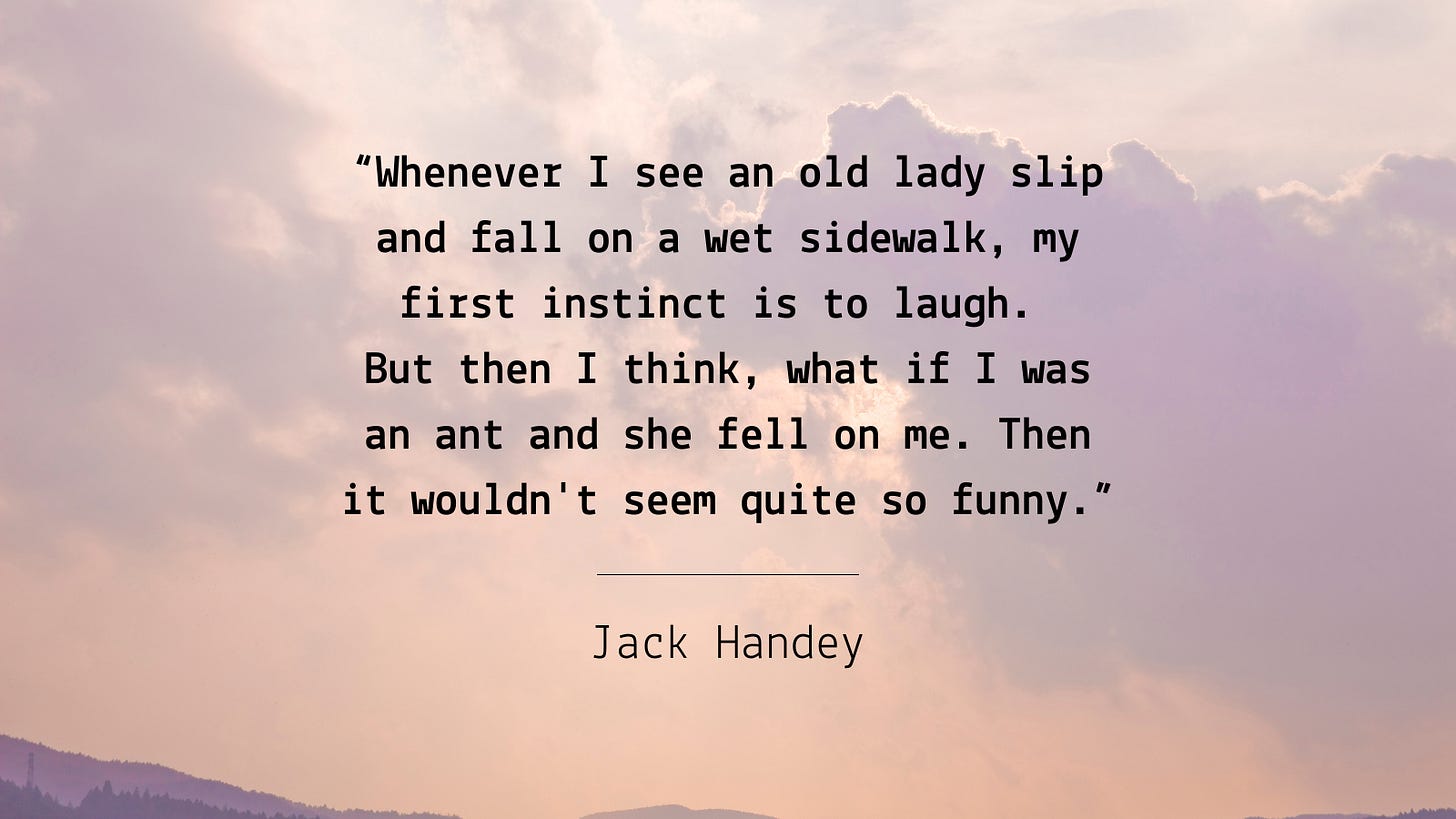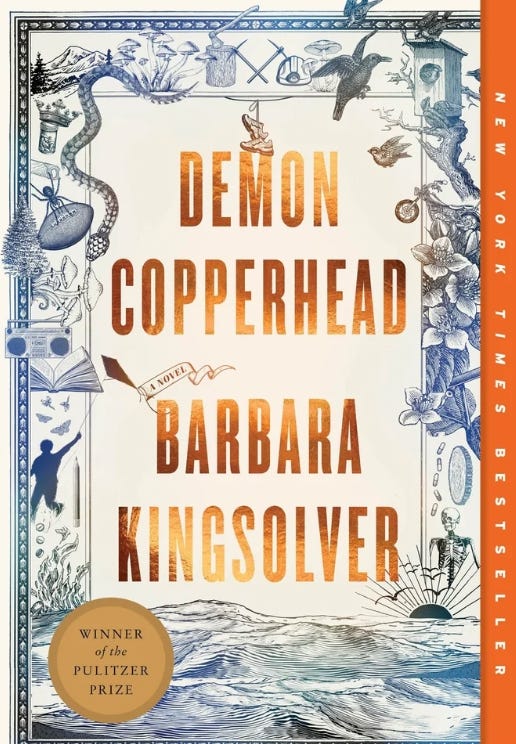The Punchline to Better Relationships
When laughter builds bridges (and when it burns them).
Hey Riffers,
Like many Americans, I’ve been finding myself turning to Comedy Central for a more enjoyable way to absorb the news. Laughter feels good, comedy brings joy, and funny people seem more attractive and likable. And hey, if you want to know what’s going on in what can feel like a pretty dark and depressing world, you might as well turn to those who can make you laugh while learning.
But sometimes, like in this recent clip with Ronny Chieng, a Daily Show correspondent I generally adore, I start feeling super uncomfortable. Chieng, in his regular segment, “Everything is Stupid,” shares a story of a woman who so repeatedly called the police department that they eventually called her to award a prize for “the dumbest person to call this police department on a repeated basis.” Watching, I felt that familiar cringe when humor crosses from funny to mean.
When it comes to humor, like pretty much anything that social science digs into, whether the laugh we get brings us closer together or drives us apart depends entirely on the ways we use it.
So let’s get academic about how to make laughter social glue rather than a sword.1
Is It Glue, or a Sword?
Studies show that the ability for humor to act as social glue depends on people being funny in ways that build bridges rather than walls. In one study, researchers got couples to fight in a lab for science.2 They identified two3 humor styles that got used during the discussions:
Affiliative humor—the kind involving witty banter, playful teasing, and spontaneous jokes that affirm both people—actually helped couples feel closer and resolve conflicts more effectively.
Aggressive humor—sarcasm, put-downs, and jokes made at a partner's expense—predicted decreased closeness and failed problem resolution. It's the difference between laughing with someone versus laughing at them.
Partners reported less emotional distress when their significant other used affiliative, or bridge-building humor, during difficult conversations. The opposite was true for aggressive humor.
Affiliative humor builds connection; aggressive humor builds walls (and possibly grounds for divorce proceedings).
I’d argue that the Jack Handey quote at the top of this newsletter perfectly captures this distinction. It starts with what looks like aggressive humor—laughing at someone's misfortune—but then immediately pivots to show perspective-taking and empathy. That shift from "haha, old lady fall down" to "wait, what if I were the ant?" transforms potential meanness into genuine insight. It's affiliative humor in disguise!
We can laugh when the six-year-old, after watching their parents stress about hosting the perfect dinner party, asks: 'Why don't we just order pizza and tell everyone it's fancy Italian?' We laugh because the kid just solved everyone's problem and we all feel like we're in on the perfect scheme.
Turning Comedy Into Connection
What makes affiliative humor so powerful? One aspect researchers have identified is that when people laugh together at the same things, they experience increased perceived similarity—essentially feeling like they "see the world the same way." This shared perspective then boosts liking and desire for connection, even among strangers.
Researchers found that roughly half of everyday texts between close partners contain shared jokes. Half! Relationships can be sustained by memes, dad jokes, and whatever passes for humor in your household. We intuitively understand laughter's relationship-building power, even if we can't always explain why that stupid inside joke about the neighbor's cat is so important to us.
It's not just any laughter that bonds us—it's shared laughter that creates the strongest social glue. When we find the same things funny, we signal compatibility and understanding in ways that saying "I understand you" never could. It's like a secret handshake for your worldview.
So how can we harness humor's relationship-building power without falling into the trap of aggressive humor or comedic delusions of grandeur?
Skip the pressure to be funny yourself and instead focus on creating opportunities for shared laughter. Schedule regular "comedy dates" with people you care about—whether that's catching a stand-up show with friends, binge-watching a sitcom with your partner, or sharing funny videos with family members. The goal isn't just entertainment; it's creating opportunities for shared laughter that can strengthen your bonds.
Use humor as a relationship appetizer. Before difficult conversations, try watching something funny together first. As the research suggests, shared laughter may help establish that sense of similarity and connection that makes challenging discussions more productive. It's emotional foreplay (but less awkward to explain to your friend or therapist)!
Use call-backs, a classic comedy tool that takes advantage of your best material. In a relationship context, this also helps you remember funny times together, deepening those inside jokes. That stupid thing that happened six months ago? It’s not just a memory, it’s social gold.
Find the funny in other people’s jokes rather than being a comedy critic.4 That is, being a good consumer of relationship comedy means looking for opportunities to laugh along when your partner, friend, or colleague tries to infuse a serious moment with humor. Your job isn’t quality control, it’s finding a reason to laugh together.
Remember the golden rule: aim for humor that includes and affirms rather than excludes or diminishes. When in doubt, ask yourself: "Am I laughing with this person or at them?" The difference between bonding and bullying often comes down to who’s included in the joke.
So, the next time you're watching comedy news and feel that uncomfortable cringe when humor turns mean, remember: the difference between connection and cruelty often comes down to a simple question—are we laughing together, or is someone getting left out of the joke? In a world that can feel pretty dark and depressing, maybe the most radical thing we can do is choose laughter that brings us closer rather than pushes us apart. Because who knows? Saving the world might just rely on better dad jokes and more generous groaning.
Like and share this newsletter! Or don't. I'm not your therapist. (But if I were, I'd ask you how that decision makes you feel.)
If you want to get really deep in the science of funny (which, surprising no one, will not make you giggle that much), check out this incredible review or the book Humor, Seriously.
So much irony in a study looking at the role of humor which brings couples into the laboratory to have a fight. But not the funny kind of irony.
There were actually 4 categories of humor coded, but raters could only reliably identify affiliative and aggressive.
I’m someone who loves to laugh but often finds my mind going blank in the moment I want to tell a joke. So I really appreciate the advice that even if you can’t tell a joke, you are fostering the humor when you find other people funny.
Incoming… Book Club!
Our semi-annual book club will be taking place on Wednesday, October 8th at 12pm EST (US) and I am excited to report I just downloaded our pick: Demon Copperhead by Barbara Kingsolver, a 2023 Pulitzer Prize winner in fiction. Fair warning: it’s 546 pages, which means we’re all about to become very creative with our reading schedules.
If you're not yet a paid subscriber but are thinking "I could really use an excuse to read more and talk about feelings with strangers on the internet," this might be your moment. If you'd like to join but finances are an issue, please don't hesitate to reach out to me—we believe in equal access to literary procrastination. If you are already a member of our group and have any questions, let me know.
And please do put it in your calendar; here are the Zoom details (which I will send the week before and the morning of, because we all know you'll lose this email):
Keep reading with a 7-day free trial
Subscribe to Relational Riffs to keep reading this post and get 7 days of free access to the full post archives.



